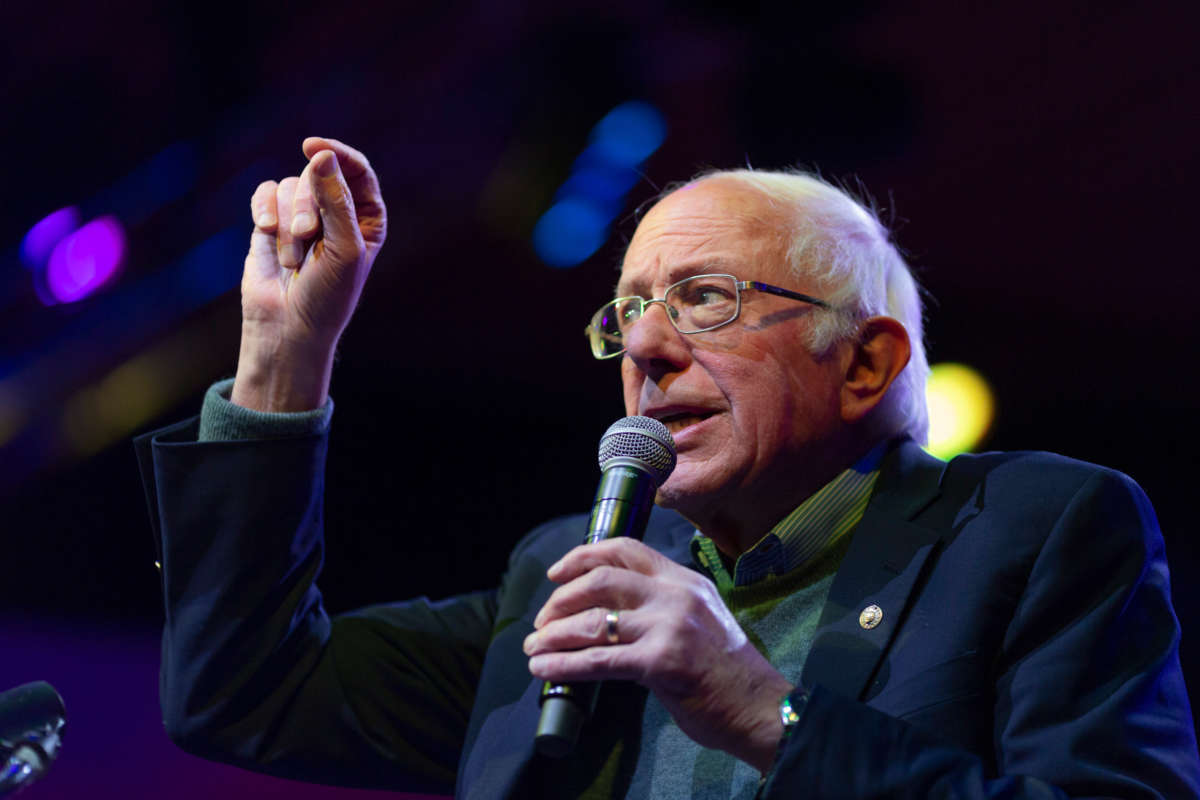As the ongoing GameStop saga sparked renewed calls for a financial transactions tax and other commonsense redistributive measures to tackle soaring inequality and Wall Street abuses, billionaire investor Leon Cooperman took to the airwaves Thursday to fume that the idea of compelling the mega-rich to pay their fair share is a “bullshit concept” and merely “a way of attacking wealthy people.”
Sen. Bernie Sanders (I-Vt.), a longtime proponent of raising taxes on billionaires like Cooperman, was not impressed.
“Oh look, another billionaire is mad that he might have to pay more taxes while children in America go hungry and veterans sleep on the street. Cry me a river,” the Vermont senator tweeted late Thursday. “Yes. We will make Wall Street billionaires pay their fair share of taxes and create an economy that works for all of us.”
A hedge fund manager who was charged with insider trading by the Securities and Exchange Commission in 2016, Cooperman is one of several industry big-wigs who has appeared on financial networks like CNBC in recent days to complain about the retail investors who banded together to send GameStop shares into the stratosphere, blowing up a ploy by short-selling hedge funds to cash in on the company’s seemingly imminent demise.
Cooperman, whose net worth is estimated to be around $3 billion, sniffed that “the reason the market is doing what it’s doing is, people are sitting at home, getting their checks from the government, basically trading for no commissions and no interest rates.”
“I’m not damning them. I’m just saying from my experience, this will end in tears,” Cooperman said as the investing app Robinhood abruptly restricted trading on GameStock and other shares, prompting members of Congress such as Reps. Alexandria Ocasio-Cortez (D-N.Y.) and Rashida Tlaib (D-Mich.) to demand hearings and an investigation.
Listen to this incredible crybaby pic.twitter.com/KmJvZpBQ59
— Timothy Burke (@bubbaprog) January 28, 2021
During the 2020 presidential campaign, Sanders proposed a Wall Street transaction tax aimed at both curbing reckless financial speculation and raising revenue that could be used to fund progressive agenda items, including tuition-free public colleges and universities.
Warren Gunnels, Sanders’ staff director, noted in a tweet Thursday that Sanders’ transaction tax would raise $2.4 trillion over the next decade — “enough to make public colleges tuition free and cancel student debt.”
“If the working class could bail out Wall Street,” Gunnels said, “Wall Street can bail out working families in America during a damn pandemic.”
HuffPost’s Zach Carter argued Wednesday that a financial transactions tax would be the “simplest solution” to an untenable status quo in which Wall Street titans are handsomely rewarded for engaging in “what is a mostly economically wasteful activity.”
“We have plenty of roads and bridges to repair and a vastly outdated transportation system,” Carter wrote. “Redistributing money from hedge funders in the Hamptons to a high-speed rail network or a national public housing program would do more for growth and productivity than all the shorts and put options in New York.”
We’re not backing down in the face of Trump’s threats.
As Donald Trump is inaugurated a second time, independent media organizations are faced with urgent mandates: Tell the truth more loudly than ever before. Do that work even as our standard modes of distribution (such as social media platforms) are being manipulated and curtailed by forces of fascist repression and ruthless capitalism. Do that work even as journalism and journalists face targeted attacks, including from the government itself. And do that work in community, never forgetting that we’re not shouting into a faceless void – we’re reaching out to real people amid a life-threatening political climate.
Our task is formidable, and it requires us to ground ourselves in our principles, remind ourselves of our utility, dig in and commit.
As a dizzying number of corporate news organizations – either through need or greed – rush to implement new ways to further monetize their content, and others acquiesce to Trump’s wishes, now is a time for movement media-makers to double down on community-first models.
At Truthout, we are reaffirming our commitments on this front: We won’t run ads or have a paywall because we believe that everyone should have access to information, and that access should exist without barriers and free of distractions from craven corporate interests. We recognize the implications for democracy when information-seekers click a link only to find the article trapped behind a paywall or buried on a page with dozens of invasive ads. The laws of capitalism dictate an unending increase in monetization, and much of the media simply follows those laws. Truthout and many of our peers are dedicating ourselves to following other paths – a commitment which feels vital in a moment when corporations are evermore overtly embedded in government.
Over 80 percent of Truthout‘s funding comes from small individual donations from our community of readers, and the remaining 20 percent comes from a handful of social justice-oriented foundations. Over a third of our total budget is supported by recurring monthly donors, many of whom give because they want to help us keep Truthout barrier-free for everyone.
You can help by giving today. Whether you can make a small monthly donation or a larger gift, Truthout only works with your support.
